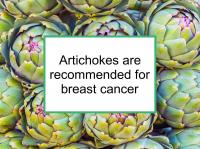Artichokes (Cynara scolymus), otherwise known as globe artichokes, are a member of the thistle family. Artichokes are a dietary source of apigenin, luteolin, magnesium, manganese, folate, and vitamin K. Artichokes also contain chlorogenic acid, ferulic acid, cynarin, silibinin and silymarin, as well as oligofructose compounds such as inulin.
Most of these compounds have been reported to have anti-cancer properties. Artichokes have been shown to have antioxidant, antifungal, antigenotoxic, liver-protective and hypoglycemic activities, as well as reducing cholesterol and ameliorating indigestion and irritable bowel syndrome.
Breast cancer-related effects of eating artichokes
Epidemiological study
An Italian population study found that the risk of breast cancer was reduced for increasing intake of apigenin, among other flavones. However, no population studies have specifically evaluated the impact of consuming artichokes on the risk of breast cancer.
Artichoke extract
Artichoke extract has been shown to inhibit proliferation and induce apoptosis (programmed cell death) in triple negative (ER-/PR-/HER2-) and HER2-positive (HER2+) breast cancer cells in the laboratory.
Artichoke extract has also been shown to enhance the effectiveness of both doxorubicin and paclitaxel chemotherapy in hormone receptor positive (ER+/PR+) and triple negative breast cancer cells.
Apigenin
Artichoke compound apigenin has also been found to induce apoptosis across a variety of breast cancer cell lines. For example, apigenin has been shown to exhibit potent growth-inhibitory effects in HER2+ breast cancer cells.
Apigenin has also been shown to inhibit the growth of patient-derived triple negative organoids and sensitize triple negative cells to doxorubicin chemotherapy. In addition, apigenin has been shown to lessen doxorubicin-induced kidney damage without reducing its cytotoxic effects against tumor cells in a mouse model of breast cancer.
Luteolin
Luteolin has also been shown to induce apoptosis across a variety of breast cancer cell lines. Luteolin has been reported to reduce ER+/PR+ cell viability in a dose- and time-dependent manner and to suppress triple negative breast cancer cell proliferation and metastasis. In addition, luteolin has been found to inhibit the growth, proliferation and migration of HER2+ breast cancer cells, as well as blocking their acquisition of stem cell-like properties.
Luteolin has also been shown to inhibit angiogenesis (new blood vessel formation) and aromatase activity (in which androgens are converted into estrogens) in the laboratory.
Additional comments
Milk thistle
Milk thistle (Silybum marianum), a herb related to the artichoke, traditionally has been used for its liver-protective properties, but increasingly is being used by cancer patients. Milk thistle is a far better source of the compound flavonoid silymarin than artichoke. Silymarin contains silibinin, silybin, silicristin, silidianin and related compounds. Silibinin is the most biologically active component of silymarin.
Silymarin has been shown to have a synergistic effect with (doxorubicin), increasing its treatment effects. However, milk thistle has been found to interfere with the activities of taxane (paclitaxel, docetaxel) chemotherapy. In addition, one study found that treatment of human breast cancer tumor grafts in rodents with silymarin isolated from milk thistle stimulated tumor growth.
Other artichokes
Cardoon (Cynara cardunculus), also known as artichoke thistle or wild artichoke, is an edible thistle-like plant native to the Mediterranean. Jerusalem artichokes (Helianthus tuberosus) are part of the sunflower family and are not related to artichokes.
Sources of information provided in this webpage
The information above, which is updated continually as new research becomes available, has been developed based solely on the results of academic studies. Clicking on any of the underlined terms will take you to its tag or webpage, which contain more extensive information.
Below are links to recent studies concerning this food and its components. For a more complete list of studies, please click on artichokes.
